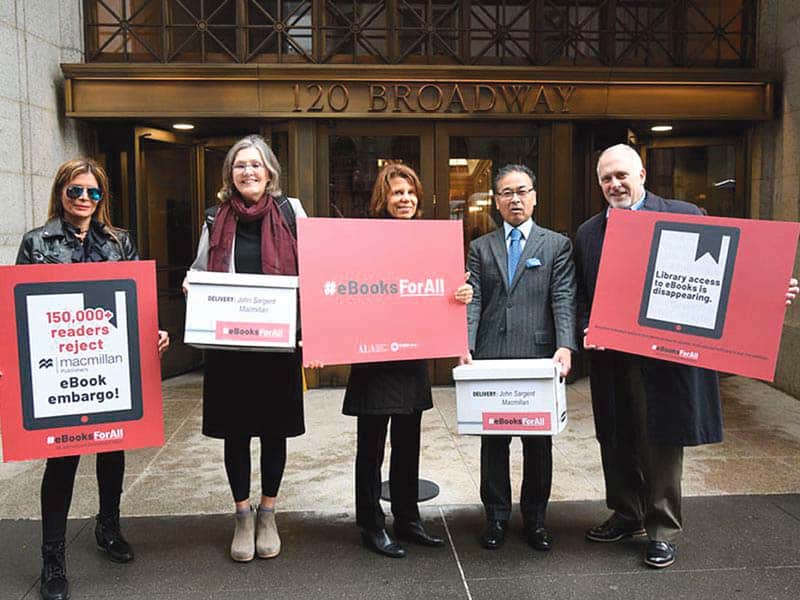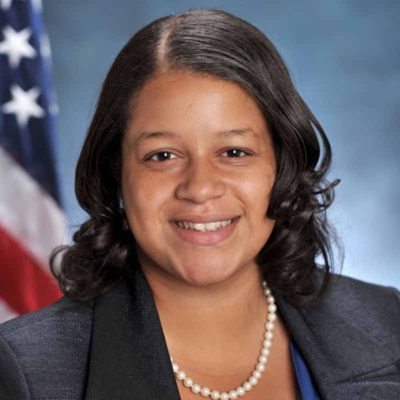
Each public library in Nassau County can only buy one copy of Macmillan’s new e-book releases. Library advocates spoke out about this issue in mid-October and are hoping for a reversal of the restriction.
Since its case in July, Macmillan is moving forward with its e-book restriction that many libraries are deeming as the e-book embargo. Soon, readers looking for e-books will have to wait at least eight weeks before another copy is available at their library.
“It’s unfortunate that Macmillan is taking this stance,” New York State Assemblywoman Michaelle Solages said. “The restriction will affect so many people who might not be able to purchase books at the time.”
 Solages recently held a press conference at the Elmont Public Library, joined by the Long Island Libraries Resources Council and the Long Island Library Systems. Representatives from Nassau and Suffolk county libraries were also present at the conference. These groups, as well as dozens of library directors and advocates, are trying to combat these limitations.
Solages recently held a press conference at the Elmont Public Library, joined by the Long Island Libraries Resources Council and the Long Island Library Systems. Representatives from Nassau and Suffolk county libraries were also present at the conference. These groups, as well as dozens of library directors and advocates, are trying to combat these limitations.
As soon as the trial was announced, the American Library Association began protesting and speaking out by using the hashtag #eBooksForAll on social media. They were at the head of the campaign against the embargo and have since received more than 190,000 signatures on a petition to reverse this plan.
Solages explained that this embargo is meant to encourage people to buy books instead of waiting weeks for an e-book copy. She also mentioned that libraries pay more than sticker price for e-books.
“Macmillan is not being a socially smart corporation,” Solages said. “They are putting profit and shareholders over readers and authors.”

Some library systems across the country have decided to boycott Macmillan e-books entirely. Other libraries have been questioning the idea of purchasing from Macmillan and will wait to see if patrons request certain books first, rather than buying stock immediately. Macmillan is one of the five largest publishing houses in the United States.
“Macmillan Publishers’ new model for library e-book lending will make it difficult for libraries to fulfill our central mission—ensuring access to information for all,” American Library Association (ALA) President Wanda Brown said in a statement. “When a library serving many thousands has only a single copy of a new title in e-book format, it’s the library—not the publisher—that feels the heat. It’s the local library that’s perceived as being unresponsive to community needs.”
E-books are an easy way for people to utilize their local libraries. This option allows libraries to be more inclusive institutions for those who may not be able get to the library due to busy schedules, as well as disabled individuals, who rely on the larger text, read aloud and in-home options the e-book offers for reading.
The first eight weeks after a book goes on sale are crucial, especially when it comes to bestsellers or highly-anticipated novels. The highest amount of revenue comes in during these beginning weeks, and Macmillan believes selling e-books to libraries could hinder those numbers.

Macmillan CEO John Sargent discussed the successful growth libraries had, due to the e-book lending option. However, the revenue on the retail level has dropped immensely. When Sargent made this announcement at the beginning of the trial, he explained that the restriction was the response “to growing fears that library lending was cannibalizing sales” of e-books.
“Sargent has been back and forth,” Solages said. “At one point, he says he’s excited to work with the community and at another, it’s all about the revenue. Shame on Macmillan.”
Libraries are establishments that provide a love of learning, as well as services, such as job trainings, senior citizen events and classes for students of all ages and abilities.
Solages, along with other advocates, is fighting to make sure libraries are treated fairly in the book purchasing ecosystem.
“Libraries are transforming, growing and providing services the community needs,” Solages said. “They are amazing institutions that should be respected and preserved in the same degree as schools.”



















